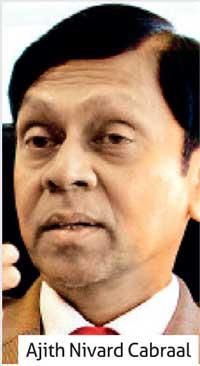28 Feb 2022 - {{hitsCtrl.values.hits}}
Amid the worsening foreign exchange crisis, the Central Bank (CB) has proposed slew of measures aimed at preserving valuable foreign exchange including higher import duties on non-essential imported goods along with several creative measures aimed at attracting foreign exchange through new avenues.
 As it continues to resist calls for an International Monetary Fund (IMF)-backed debt restructuring programme, the CB has proposed seven measures to the government in a bid to attract new forex inflows and retain the existing forex resources within the country, which are in addition to the measures currently in place. Accordingly, the CB has proposed the government to impose higher duties on about 700 imported items which are considered ‘non-essential’ to curtail demand and to increase government revenue. Amid rising global oil prices,the CB has called on the government to increase fuel prices at the pump pointing out it would lower oil demand which will lead to lower forex outlay for fuel imports.
As it continues to resist calls for an International Monetary Fund (IMF)-backed debt restructuring programme, the CB has proposed seven measures to the government in a bid to attract new forex inflows and retain the existing forex resources within the country, which are in addition to the measures currently in place. Accordingly, the CB has proposed the government to impose higher duties on about 700 imported items which are considered ‘non-essential’ to curtail demand and to increase government revenue. Amid rising global oil prices,the CB has called on the government to increase fuel prices at the pump pointing out it would lower oil demand which will lead to lower forex outlay for fuel imports.
Further, the CB believes that this measure would ensure liquidity for State-owned banks and reduction in losses to Ceylon Petroleum Corporation (CPC).
As another effort to cut energy costs and as a solution to fuel shortages, the CB has recommended to the government to introduce a new scheme of voluntary flexible working hours and work-from-home measures for offices.
Further, the CB has also stressed on the importance of fast-tracking solar and wind energy projects, which would result in lower fuel imports for electricity generation while attracting new foreign direct investment inflows and employments generation. In terms of attracting new forex inflows to the country, the CB has proposed the government to allow imports of vehicles which can be financed with inward remittances including import duty and other charges.
The CB believes that this would enable the government to collect a large sum of revenue in forex in an environment where inward remittances continue to decline as remitters resort to unofficial channels to remit their funds amid the wide gap between official exchange rate and grey market rates. Along with it, the CB has also recommended the government to extend the EPF scheme to expatriate workers in a bid to attract new savings into the country via forex. The CB has also renewed its calls for monetising State assets which have been identified as non-strategic and under-utilised. With the disposal of such assets, the CB expects it would create a pathway for new non-debt creating forex inflows while enhancing economic activities.
Sri Lanka’s official external reserves fell to US$ 2.36 billion by the end of January this year from US$ 3.14 billion by the end of December 2021, as the government settled foreign currency loans and funded essential imports. Meanwhile, the CB is expected to unveil a new nine-month road-map by end of March as the current six-month road map comes to an end. CB Governor Ajith Nivard Cabraal earlier assured that the country’s gross official reserves would be enhanced to cover a minimum of four months of imports by March end.
15 Nov 2024 7 hours ago
15 Nov 2024 8 hours ago
15 Nov 2024 8 hours ago
15 Nov 2024 9 hours ago
15 Nov 2024 9 hours ago